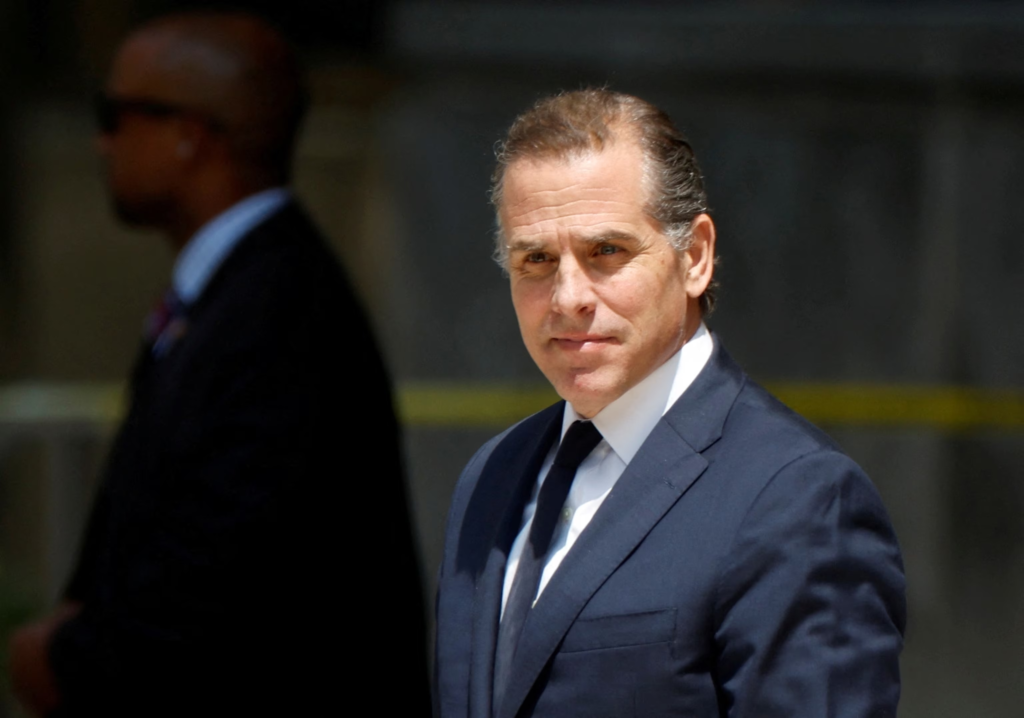
Jonathan Ernst/Reuters
BY ELLA LEE, REBECCA BEITSCH AND ZACH SCHONFELD
Hunter Biden filed a series of motions challenging gun charges brought against him in Delaware, arguing special counsel David Weiss “buckled under political pressure” in bringing the case.
Biden’s motion to dismiss the case as a “vindictive prosecution” came alongside several other challenges, including one claiming Weiss was illegally elevated into the special counsel role.
The others address the gun charges he was set to plead guilty to under a plea deal, saying he should be immune under the prior agreement while the Second Amendment protects his right to buy a weapon despite drug use.
Biden argued the plea agreement that would have sent him to a pretrial diversion program for lying about his history of drug use when purchasing a weapon was Weiss’s initial plan for how to approach the case.
“The announcement that this case would be resolved through a Diversion Agreement and a Plea Agreement drew a sharp rebuke from former President Trump (who appointed Mr. Weiss), extremist House Republicans, and the far-right media. They made it clear that they wanted Mr. Weiss to keep this litigation alive through the presidential election,” Biden’s legal team wrote in the 69-page filing.
“Because the facts in the case did not change and the law only became more difficult for such prosecutions, the public record supports no conclusion other than Mr. Weiss changed his decision because he buckled under political pressure to bring more severe charges.”
The filing echoes another filed by Trump himself, who has also sought to dismiss charges against him in the federal election interference case, arguing they are politically motivated.
Biden’s counsel also said federal prosecutors reneged on a plea agreement that would have allowed him to forgo the gun charges all together.
They argued that the deal Biden agreed to was supposed to provide him immunity from offenses concerning the purchase of firearms in exchange for him “giving up various rights,” including his Fifth Amendment right to remain silent.
“As the prosecution told the Court, ‘based on the terms of the agreement. . . . we cannot bring firearms charges based on the firearm identified in the factual statement to the Diversion Agreement,’” Hunter Biden’s counsel wrote. “Nevertheless, the prosecution did just that, by subsequently bringing this Indictment charging Mr. Biden with three felony firearm offenses, which all relate to the firearm identified in the Diversion Agreement’s factual statement.
“Because Mr. Biden gave up valuable rights as part of this contract, in exchange for the prosecution’s promise not to prosecute him, ‘such promise must be fulfilled,’” the lawyers continued.
Federal prosecutors indicted Biden on three gun-related charges in September — two counts for failing to disclose drug use when seeking to buy a weapon and another for unlawful possession of a firearm while addicted to a controlled substance. He pleaded not guilty to all charges.
He pleaded not guilty to all charges after a plea agreement with the government fell apart this summer when the judge overseeing the case questioned the parameters of the deal. Under the agreement, he would have pleaded guilty to two tax offenses in order to avoid a formal gun-related charge under specific conditions.
Biden also brought a long-anticipated argument that his gun possession charge is unconstitutional under the Supreme Court’s landmark expansion of Second Amendment rights last year in NYSRPA v. Bruen.
Biden’s attorneys noted that one federal appeals court has already invalidated the statute in question. Once that charge is ruled invalid for Biden’s case, the other charges automatically collapse, they asserted.
“While Congress could criminalize gun possession from someone who was actively intoxicated, or perhaps someone who at least actively had a controlled substance in their body, a prohibition on gun ownership by anyone who had at some time used a controlled substance is constitutionally overbroad under Bruen,” Biden’s attorneys wrote.
The filing also delves into questions surrounding Weiss’s authority as special counsel, arguing that as the U.S. Attorney for Delaware, he is unable to serve in the role concurrently.
“That appointment is flatly precluded by the U.S. Department of Justice’s own regulations setting the ‘Qualifications of the Special Counsel,’ which provide: ‘The Special Counsel shall be selected from outside the United States Government,’” Biden’s attorneys wrote.
The filings give a preview into how Biden may handle a second indictment brought by Weiss last week, filing three felony and six misdemeanor tax charges in California in court filings that relied heavily on details about his personal life in alleging his flouting of his obligation to pay taxes.
